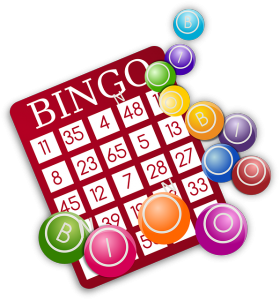 Alright, it’s been some time since I said my first hello and I have been wondering how to begin. First steps are always a struggle…although…in the animal kingdom it’s not always the case. I guess there’s the downside of having a more advanced brain, you need some time to work it all out. Just imagine babies being able to use their limbs properly and run around from day one…dear…the mess that would be! Let’s not digress. So yes, it seemed logical to start with the typical childish (I’ just on a roll today!) question – Why? Why do so many people enjoy bingo and is that really a good thing.
Alright, it’s been some time since I said my first hello and I have been wondering how to begin. First steps are always a struggle…although…in the animal kingdom it’s not always the case. I guess there’s the downside of having a more advanced brain, you need some time to work it all out. Just imagine babies being able to use their limbs properly and run around from day one…dear…the mess that would be! Let’s not digress. So yes, it seemed logical to start with the typical childish (I’ just on a roll today!) question – Why? Why do so many people enjoy bingo and is that really a good thing.
I looked into the history of the game. Without boring you with too much detail, let’s just jot down the most important events and get to the interesting stuff. It all started back in 1530 in Italy as Lotto d’Italia. Being simple, relaxing and fun game, it easily and quickly spread across Europe and was even used in educating children (there I go again!), making the learning experience lighter and more memorable. In 1778 the French developed Le Lotto, which is the origin of the modern five by five bingo card. When the game got to America, they were playing it with dried beans and calling the game “Beano”, which somehow (in a typically American fashion imho) in time they changed to “Bingo”.
Now what’s more interesting, the up sides of playing bingo apparently go far beyond just filling in time and making some cash. In a study by the Case Western Reserve University, researches found out that the game has benefits that extend well beyond socializing, especially for people with cognitive difficulties and visual perception problems. Another finding was that bingo players display faster hand and eye reflexes and are more accurate for longer into old age, since playing bingo regularly requires quick responses and keeps their brain alert.
Another expert in their field – Julie Winstone, of Southampton University, says players are faster and more accurate than non-bingo players.This all seems logical since, as I said above, playing requires and develops the ability to scan for information and memorise things quickly. „Concentration has been shown to decline with age so bingo could be helping older people sustain their attention for longer.”, she shared in an interview with the Guardian. So clearly, there is evidence that we, bingo lovers, are not a bunch of crazy old people, we are just on our way to becoming crazy old people. No, I am kidding. I have actually done my homework and the game is on the rise, especially over the past 2015, with younger and younger audiences being attracted to it, and the age gap of average bingo players age dropping to 25-30 yo. I did even come across some house party bingo nights whilst doing my research, but I think I might pass on that particular one.
There we go, first post done and over, I hope you had a good time reading it, do let me know if you have something to add or just say hi for no reason, I’d be glad to hear from you. Enjoy your day and hope to see you back soon!
